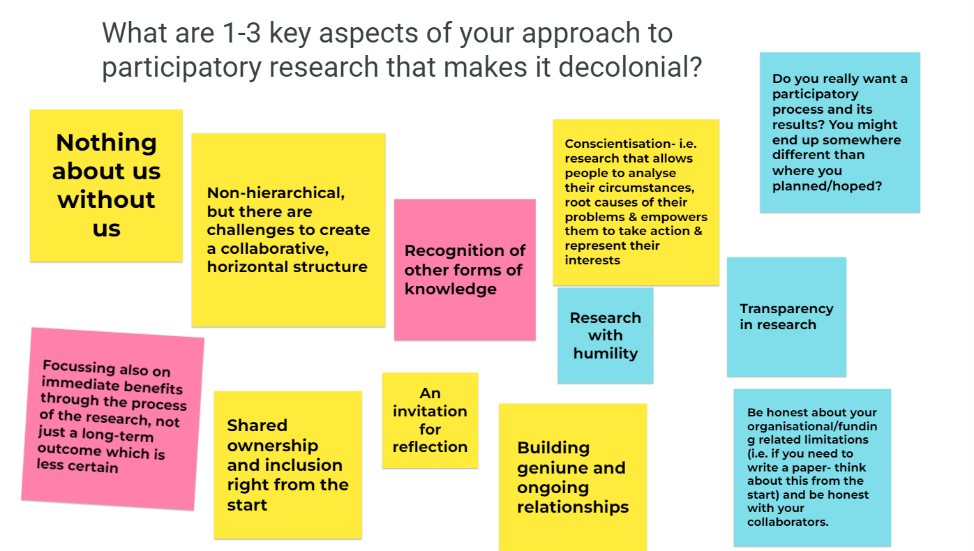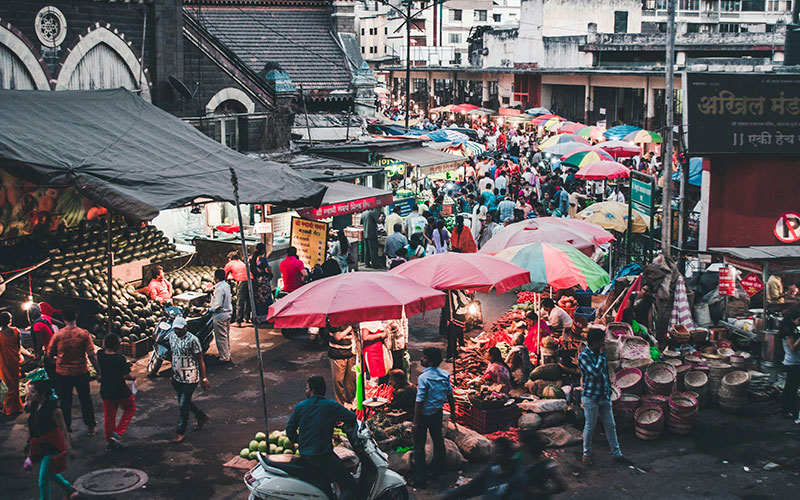In May and October 2023, the IGDC hosted two workshops in partnership with the Federal University of Bahia (UFBA), at University of York. IGDC members from across the University of York and members from Insituto de Saude Colectiva (Institute for Collective Health- ISC), UFBA attended the workshop that focused on our shared interests in decolonizing global development research.
These workshops sought to specifically explore the role of participatory research as a means and method to decolonize global development. We asked participants “what are the potential benefits or pitfalls of decolonization through participatory research methods”?
Our aims were to learn from each other’s experiences of using participatory research methods and brainstorming good practices and principles of decolonization of and through participatory methods.
Principles of decolonizing development research
Our discussions brought forward several principles in decolonizing global development research. These included critically assessing structures, processes, and needs implicated in generating development research. Participants’ reflections on the principles of decolonial project design laid emphasis on centralising the needs and voices of Global South partners to counter colonial legacies that privilege access to knowledge for elite, white, Western audiences and thinkers.
The decolonization agenda is, however, more than ‘diversifying’ or changing representation in knowledge formations, although this is also important. Rather, decolonial thought must be integrated in development research agendas in ways that mitigate deep-seated power imbalances.
As decolonial scholar Linda Tuhiwai Smith reminds us in her influential work Decolonizing Methodologies (2021) –
“research is not an innocent or distant academic exercise but an activity that has something at stake and that occurs in a set of political and social conditions.”
In her presentation at our workshop, UFBA Professor Leny Trad reflected on this statement and its implications on patterns of international research cooperation, wherein colonial power relations are often reproduced through the control of research budgets and agendas in the Global North, while the Global South tend to be sites of data collection or in some cases, ‘extraction’.
Our participants spoke of strategies to counter these tendencies through reflection on who defines research priorities, roles, planning processes and how research is published (for e.g. what languages are adopted and how accessible is the research). Alongside these reflections, participants spoke of establishing efficient modes of communications and trust building among research partners and participants. See also IGDC’s guide to inclusive research.
Overcoming power relations in knowledge generation will likely elicit discomfort. Development and knowledge are intimately linked with, and indeed constitutive of, colonial logics and structures. In this context, development researchers must recognize the complicity of high education institutions in reproducing hierarchies of knowledge production, through for e.g. enforcing disciplinary boundaries or organising researchers (and the validity of their knowledge) according to levels of educational attainment.
In turn, methodologies such as participatory research may seemingly contradict standards of rigour or validity enforced in higher education learning. Decolonizing research thus involves uncomfortable encounters with researchers’ own epistemic constraints and its relationship with power and coloniality.
Participants at our workshop argued that decolonizing development research implies recognizing that concepts are not the only form of knowledge, and that embracing other capacities for “knowing”, such as the body and senses. In doing so, decolonial methodologies may serve to rupture colonial divides between the mind and body or the rational and sensory.
“(Establish an) equitable, collaborative, pluriversal process of mutual learning which acknowledges past and present injustices, avoids unnecessary hierarchies and gives proper credit particularly to Majority World scholars and though leaders”
An extract from a workshop exercise asking participants to formulate a core principles for decolonization
Decolonization is an unfinished process, one fraught with tensions, which cannot be totally resolved but must be continuously negotiated.
A participant’s feedback on the key “take-away” from the workshops

Arts-based methods and participatory research
A common research theme that emerged through this exploration was the use of arts-based methods in participatory research and its potential for decolonizing research. Both our institutions are engaged in projects where the art-based methods have been central in exploring other ways of accessing experiences and engagements with inequality, injustice, health, and wellbeing.
Researchers from ISC- Lara Beck, Saulo Moreira and Tainá Azevedo- discussed their experiences of using ArtEthnography in project ECLIPE, an interdisciplinary and participatory research project developed in communities in Brazil, Ethiopia and Sri Lanka. IGDC members Emile Flower and Ana Bilbao Yarto discussed their research and engagement with arts-based methods (see the Arts Rights Truth project hosted at the Centre for Applied Human Rights), activism and human rights, while Steven Johnson offered insights into how science and engineering can be reimagined – and historic power relationships upturned – through sustained creative engagement with local communities.
These researchers presented their reflections on participatory research that seeks to “address extractive processes and inaccessible practices through co-creation and co-ownership – some of the principal concerns of decolonization.” (Emilie Flower’s presentation). In this context, art-based methods can serve to both create communities and friendships (as stressed in ECLIPSE project’s experiments with Artnoethnography), as well as foster critical thinking (Flower).
Participants thus discussed the potential of art as an alternative methodology that is not only participatory, but also disruptive to linear, rigid research agendas that view methods as a means of extraction rather than engagement. Methods in global development research can also be re-imagined as encounters that goes beyond research, towards recognizing different audiences, needs and voices.
Conclusion
For us, these endeavours were a means to generate ideas that would serve as a source of inspiration, critical (self) reflection and experimentation with themes and issues related to global development. They form a part of an ongoing conversation and emerging platform for collaboration between our institutions to explore and learn from each other’s experiences in the co-production of research linked to global development.
Other useful resources: Linda Tuhiwai Smith’s Decolonising Methods and Methodologies video on our YouTube channel where Dr Smith discusses decolonising research methods and provides reflections regarding the practical conduct of social science research methods. She also talks about how to navigate and resist colonial legacies of knowledge production and resist extractivist models.


One thought on “IGDC – UFBA Workshops: towards a decolonizing global development”
Comments are closed.